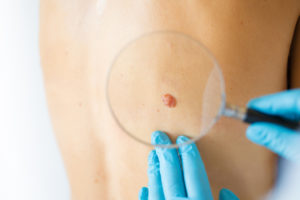What is Melanoma?
One of the most common cancers seen in Americans today is that of skin cancer. Skin cancer includes three different varieties that can develop, including basal cell carcinoma, squamous cell carcinoma, and melanoma. Melanoma is the most dangerous of them all, killing one American every hour. With early detection, diagnosis, and treatment, many patients are able to combat this condition and experience a successful recovery. However, this requires that patients are proactive in monitoring their body for the signs of skin cancer.
What is melanoma?
Melanoma is a variety of skin cancer that can become deadly without proper diagnosis and treatment. Approximately 50,000 individuals in the United States are told each year that they have melanoma. The cancer develops in melanin cells called melanocytes. These pigmentation cells are what reach to sun exposure, causing tan or darkened skin. They are also responsible for moles. While most moles are benign, any changes to them may indicate cancerous cells. The melanocytes may invade adjacent tissues and cause possible spreading throughout the body, called metastasizing. It is one of three types of skin cancers, though the most serious.
What changes happen to moles that may indicate the presence of skin cancer?
Moles themselves do not mean that a patient has skin cancer. However, certain changes that may occur to the moles may be an indication that there is a concern. Patients should have annual skin cancer screenings, during which dermatologists can evaluate the patient from head to toe, looking for growths, lesions, or moles that may be indicative of cancerous skin cells. A biopsy may be taken, during which the doctor removes a sample of the tissues to test for cancer. Patients who may have skin cancer may notice changes in the moles including size, shape, color, and border. Any of these changes should be evaluated by a professional for early detection and diagnosis.
Call the Skin and Laser Surgery Center of New England today
If you suspect that you may have skin cancer, or are past due for a skin cancer screening, we encourage you to contact one of our three office locations throughout the area of New England to book an appointment at the skin cancer surgery center. Our facility welcomes new and current patients who are interested in cosmetic and medical dermatology solutions for themselves and their families.

